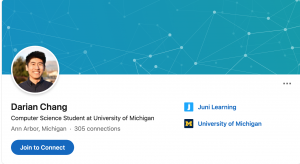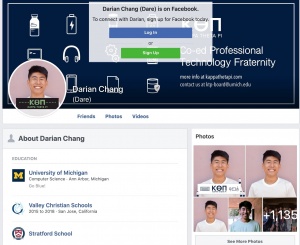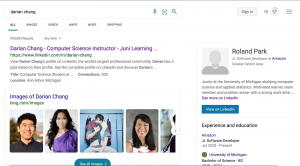Darian Chang
Contents
Introduction
Before I dive into what I found, I’m Darian Chang. Growing up, I never met another person named Darian Chang, not even another Darian, so I like to believe my name is uncommon. I’ve always liked the uniqueness of my name. However, in regards to online data and one’s privacy, I believe this uniqueness to be a bad thing. It disturbs me how someone could potentially find a plethora of information about me in mere seconds with a quick internet search.
Thoughts Before the Search
Back in middle school and high school, I was very much into social media. I had accounts on many social media platforms that were popular during that time ranging from Google Plus and Ask.fm back in the olden days to Facebook and Instagram when I was in tenth grade. Throughout the years, I have slowly drifted away from social media. Starting from tenth grade, I realized that I had an unhealthy relationship with it and have slowly been cutting it out since. Since then, my social media consumption has not only changed but I have changed as a person as well. Before performing any searches of myself online, I was curious what the results would be. Would the results resemble who I was in the past, who I am currently, or both?
The Initial Search
When searching for myself, I was concerned that using just one search engine would not give me an accurate representation of data and that cookies could skew my searches. Consequently, I used various search engines such as Google and Bing and also incognito mode on Google Chrome and compared the results.
A quick Google search of my first and last name immediately led me to several of my online profiles.
The first search result was my Linkedin profile, which clearly stated in the header that I am a student at the University of Michigan and also a computer science instructor at Juni Learning. When clicking on my Linkedin, one could see my past work experience and also the extracurriculars that I am involved in on campus. From all this information, one could conclude that I am really passionate about technology through my coursework and clubs and education through my past work experience at a STEM summer camp and also my current job. I didn’t mind the first search result. The information wasn’t as personal and I wouldn’t mind if a complete stranger knew these details about me, as I spent hours in the past curating and constructing information for my Linkedin profile knowing full well that strangers such as recruiters or people in my industry would look at it. Just from looking at my Linkedin, one could get a good sense of who I was professionally and nothing else.The second search result was my Facebook. As expected, my Facebook revealed a lot more intimate information. Firstly, it showed my education. Unlike Linkedin, it revealed not only my college but also my high school and middle school names as well. In addition, one could view all of the pictures I have taken with my friends throughout the years. It surprised me that there were over 1000 of these pictures which included snippets of when I went to San Francisco with my friends to team photos of me with my badminton team in high school. It also clearly displayed many of my interests such as basketball, video games, and other interests that from the past that I forgot I was even interested in.
My portfolio website, which I made just this winter break, was another one of the top search results. This website contains all of the content on my Linkedin and more. I built and designed it myself, and it goes more into depth on my past work experience and extracurricular activities and also contains a short snippet of what I enjoy doing in my free time.
Among other results included social media accounts for another person named Darian and also the Medium article I published for this class just a week ago! In addition, when I clicked under the images tab, there were no photos of me.
Bing
I expected Bing to give similar results. I was wrong to a certain extent. I put in my first and last name and was surprised at what I saw.The first search, my Linkedin, was still the same. Everything after that, however, was vastly different. The second search result led to voice.com and contained the profile of another person with the same name as me who was a professional voice actor. Another surprising result was that it gave me information about my friend Roland, who is in my fraternity and also in this class. I was perplexed by this result. At first, I thought it was a mistake and tried searching my name again, only to be met with the same result.
My social media was nowhere to be seen when searching up myself on Bing. However, my Linkedin profile photo was the first photo to come up under images.
More Specific Searches
After initially searching my first and last name, I was curious to see what would happen if I provided more information to my search. Some of the search queries I used included ‘Darian Chang Instagram’, ‘Darian Chang askfm’, and 'Darian Chang Google Plus'. To my surprise, I was not able to find a lot of the accounts that I have drifted away from over the years. Other search results included accounts for other people named Darian and also one for a person called Ian. Maybe this is a good thing.
Reflections
From both my general search and also my specific search, I realized that my online identity isn’t representative of who I am as a person. As of now, it certainly provides good information of where I am currently professionally, but lacks detail in areas outside of that. For the more personal details that did come up in my searches, most of it was outdated. For example, my Facebook showed several of my old interests like soccer and One Direction, both of which I have drifted away from in recent years.
The data fails to encompass who I am as a whole and who I am today, and this can be largely attributed to the fact that I have drifted away from most social media use. This is because when we are using social media, we are either unknowingly or voluntarily providing information through the people that we are following, the posts that we like, and the pages that we visit, which could be used by social media companies later on. So why are my professional details so updated when everything else isn’t? This is because I have been incredibly active lately on Linkedin in the past year as I have been trying to secure a summer internship. In contrast, I haven’t touched my Facebook or Instagram in years.
In regards to my more specific searches, I was pleasantly surprised when I wasn't able to find my older social media accounts on platforms such as Ask FM and Google Plus. I was so shocked because I grew up with the belief that once something is on the Internet, it would be there forever. After researching myself online, I still believe this is true, but in a different sense. Before, I believed that anything that was put online would be easily searchable and findable. Now, I still believe that anything that we put on the internet would be there forever, just that it might not be able to be accessed publicly.
Conclusion
Of the information I saw, all of it was put out by me voluntarily, whether it be recently or many years ago. I was happy with how the searches came out and how none of them revealed anything too personal in regards to my current life. While my initial decision to take a step back from social media was due to my toxic relationship with it, I was pleased that the decision also was able to indirectly limit the information of me online. To answer the question I posed before I began my searches, I would definitely say that the results represented both who I was in the past and also who I am now in regards to different aspects. The search results provide a good depiction of where I am currently in a professional sense and where I was before in regards to my personal life, which can be attributed to how I have shifted from using social media for leisure to using it for work over the years.


